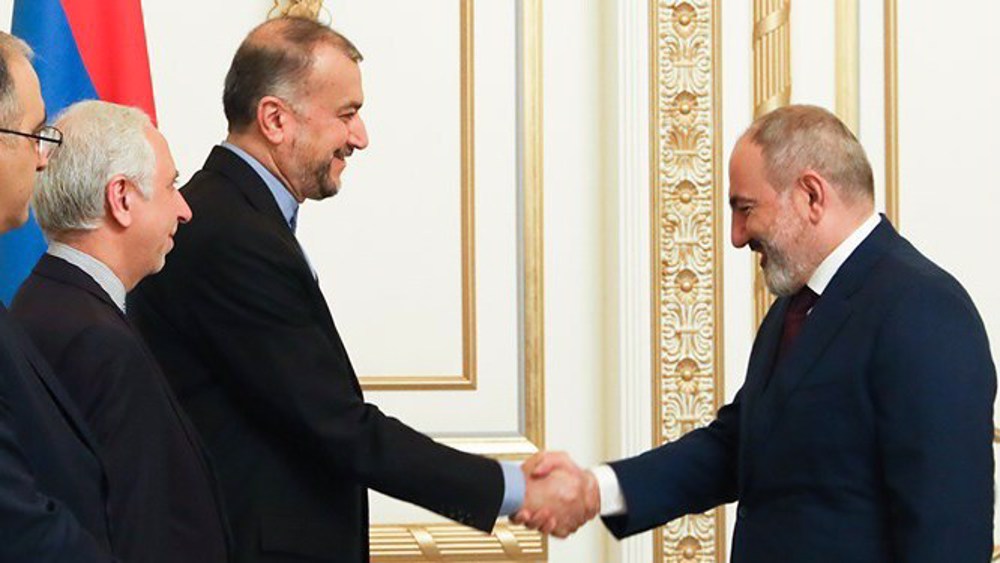AhlulBayt News Agency: Iran’s Foreign Minister Hossein Amir-Abdollahian has reiterated the country’s opposition to any change in regional borders in a meeting with the Armenian Prime Minister Nikol Pashinyan.
During the Saturday meeting, which took place in Yerevan, Amir-Abdollahian stressed the need for promoting the North-South Transportation Corridor through Armenia, saying, “The Islamic Republic of Iran is opposed to any change in regional geopolitics and borders."
Highlighting Iran’s opposition to the presence of foreign forces in the region, Amir-Abdollahian said intrinsic mechanisms of the region must be used to settle the existing disputes, adding, “Regional problems must be solved by regional countries.”
He said Tehran supports the 3+3 mechanism of cooperation among regional countries, which features the three South Caucasian countries of Armenia, Georgia, and Azerbaijan plus Russia, Turkey, and Iran
His remarks came against the backdrop of a bubbling and periodically deadly dispute between Armenia and its neighbor Azerbaijan over the Nagorno-Karabakh region. Nagorno-Karabakh is internationally recognized as part of Azerbaijan, but has been populated by ethnic Armenians.
Last month, simmering tensions between the neighbors caused a fresh escalation over the region, leaving nearly 100 soldiers dead on both sides. This was the most recent conflict between the Caucasus' countries since thousands were killed in a 44-day war over the territory that ended in November 2020.He said the Islamic Republic was supportive of establishment of permanent peace between the Caucasus' neighbors and resolution of their border differences.
Elsewhere in his remarks, Amir-Abdollahian stressed the importance of further development of relations between Iran and its neighbors, including Armenia, as part of the Iranian government's foreign policy efforts.
Iran's foreign minister voiced his country's support for the establishment of permanent peace between the Republic of Azerbaijan and Armenia, while emphasizing the necessity of settling border disputes, stabilizing regional borders, and protecting territorial integrity of all regional countries.
He also emphasized the necessity of boosting intra-regional economic and cultural cooperation as means of reinforcing the neighborly relations among the countries of the region.
Elsewhere in his comments, Amir-Abdollahian hailed inauguration on Friday of Iran's consulate general in the southern Armenian city of Kapan as a means of developing bilateral ties, especially in the areas of commerce, transportation, and transit. He also welcomed potential establishment of Armenia's consulate general in the northwestern Iranian city of Tabriz.
Iran's top diplomat noted that the volume of the two countries' bilateral trade, which currently stands at $700 million, should be enhanced to $1 billion in the first stage and to $3 billion at later stages given the existing potentialities in the areas of commerce, energy and agriculture as well as barter trade of electricity and gas.
/129
During the Saturday meeting, which took place in Yerevan, Amir-Abdollahian stressed the need for promoting the North-South Transportation Corridor through Armenia, saying, “The Islamic Republic of Iran is opposed to any change in regional geopolitics and borders."
Highlighting Iran’s opposition to the presence of foreign forces in the region, Amir-Abdollahian said intrinsic mechanisms of the region must be used to settle the existing disputes, adding, “Regional problems must be solved by regional countries.”
He said Tehran supports the 3+3 mechanism of cooperation among regional countries, which features the three South Caucasian countries of Armenia, Georgia, and Azerbaijan plus Russia, Turkey, and Iran
His remarks came against the backdrop of a bubbling and periodically deadly dispute between Armenia and its neighbor Azerbaijan over the Nagorno-Karabakh region. Nagorno-Karabakh is internationally recognized as part of Azerbaijan, but has been populated by ethnic Armenians.
Last month, simmering tensions between the neighbors caused a fresh escalation over the region, leaving nearly 100 soldiers dead on both sides. This was the most recent conflict between the Caucasus' countries since thousands were killed in a 44-day war over the territory that ended in November 2020.He said the Islamic Republic was supportive of establishment of permanent peace between the Caucasus' neighbors and resolution of their border differences.
Elsewhere in his remarks, Amir-Abdollahian stressed the importance of further development of relations between Iran and its neighbors, including Armenia, as part of the Iranian government's foreign policy efforts.
Iran's foreign minister voiced his country's support for the establishment of permanent peace between the Republic of Azerbaijan and Armenia, while emphasizing the necessity of settling border disputes, stabilizing regional borders, and protecting territorial integrity of all regional countries.
He also emphasized the necessity of boosting intra-regional economic and cultural cooperation as means of reinforcing the neighborly relations among the countries of the region.
Elsewhere in his comments, Amir-Abdollahian hailed inauguration on Friday of Iran's consulate general in the southern Armenian city of Kapan as a means of developing bilateral ties, especially in the areas of commerce, transportation, and transit. He also welcomed potential establishment of Armenia's consulate general in the northwestern Iranian city of Tabriz.
Iran's top diplomat noted that the volume of the two countries' bilateral trade, which currently stands at $700 million, should be enhanced to $1 billion in the first stage and to $3 billion at later stages given the existing potentialities in the areas of commerce, energy and agriculture as well as barter trade of electricity and gas.
/129

